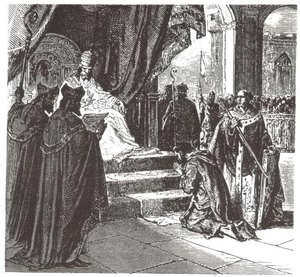Louis the Pious
|
|
Louis the Pious (also known as Louis I, Louis the Fair and Louis the Debonaire, German form: Ludwig der Fromme, French form: Louis le Pieux or Louis le Débonnaire, Spanish form: Ludovico Pío) (April 16, 778 – June 20, 840) was Emperor and King of the Franks from 814 to 840.
Born in Casseuil-sur-Garonne, in today's Gironde, France, the second son of Charlemagne, Louis was crowned king of Aquitaine as a child and sent there with regents and a court to rule in order to quiet rebellions which were forming after Charlemagne's defeat by the Moors in Spain.
When Charlemagne's other sons Pepin (810) and Charles (811) died, he was crowned co-emperor with Charlemagne in 813. On his father's death in 814, he inherited the entire Frankish kingdom and all its possessions. He was crowned emperor by Pope Stephen V in Reims in 816. Louis used Benedict of Aniane, a Septimanian Visigothic nobleman and monastic founder to help him reform the Frankish church. One of Benedict's primary reforms was to ensure that all religious houses in Louis' realm adhered to the Rule of St Benedict, named for its creator, Benedict of Nursia (AD 480-550).
Like most Frankish men Louis, who was the second son of Charlemagne, expected to share his inheritance with his brothers Charles the Younger and Pepin. However, both of them died before he did - Charles in battle and Pepin subsequent to his blinding and confinement after joining in a revolt against his father - and Louis inherited the Frankish empire intact.
Shortly after his accession, he secured his position as emperor in a "moral purge," in which he sent all of his illegitimate half-brothers to monasteries and all of his unmarried sisters to nunneries. In 817, his nephew Bernard, King of Italy, rebelled against his overlordship, and after suppressing the rebellion, he had Bernard blinded and imprisoned. Bernard died the next year. As a deeply religious man, however, Louis wanted to make penance for causing Bernard's death, and did so at Attigny in 822, in front of the nobles of the realm. This act greatly reduced his prestige as a ruler.
In 817, Louis laid out plans for an orderly succession by dividing the empire between his three sons from his first marriage with Ermengarde: Lothar (who was crowned king of Italy and co-emperor), Pepin of Aquitaine (king of Aquitaine) and Louis the German (king of Bavaria). After Ermengarde's death, he remarried with Judith of Bavaria and had a fourth son, Charles, in 823. Louis' attempts to add Charles to his will met with the stiff resistance of his older sons, and the last decade of his reign was marked by civil war. In 829, he stripped Lothar of his position of co-emperor and banished him to Italy. In 830, the three brothers invaded their father's lands, forcing him to abdicate in favor of Lothar. Louis the Pious returned to power the next year and stripped Lothar not only of imperial title, but also of the kingdom of Italy, which he bestowed on Charles. Pepin revolted, followed by Louis the German in 832, and Lothar, with the support of Pope Gregory IV, joined the revolt in 833. The brothers defeated their father and imprisoned him along with Charles. Judith was sent to a nunnery, while Pepin and Louis the German both annexed formerly imperial lands. In 835, however, the family made peace and restored Louis to the imperial throne.
When Pepin died in 838, Louis the Pious declared Charles the new king of Aquitaine. The nobles, however, elected Pepin's son Pepin II. When Louis died in 840, the dispute plunged the brothers into a civil war that was only settled in 843 by the Treaty of Verdun (843) which split the Frankish realm into three parts, the kernels of later France and Germany. The dispute over the kingship of Aquitaine was not fully settled until 860.
| Preceded by: Charlemagne | Frankish King Also Holy Roman Emperor | Succeeded by: Charles II, Lothar and Louis II |
Related articles
- Franks (main history of Frankish kingdoms)
- Carolingiansbg:Луи Благочестиви
de:Ludwig der Fromme es:Ludovico Pío fi:Ludvig Hurskas fr:Louis Ier he:לואי האדוק nl:Lodewijk de Vrome pl:Ludwik I Pobożny ro:Ludovic Piosul

